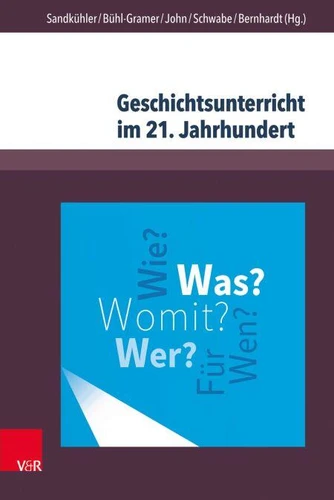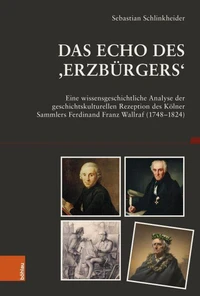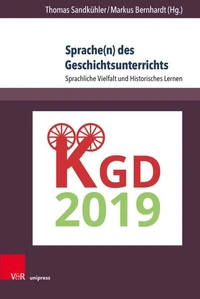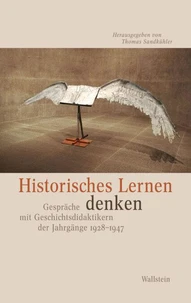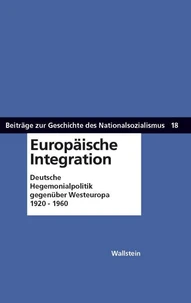Geschichtsunterricht im 21. Jahrhundert. Eine geschichtsdidaktische Standortbestimmung
Par : , , , ,Formats :
Disponible dans votre compte client Decitre ou Furet du Nord dès validation de votre commande. Le format PDF est :
- Compatible avec une lecture sur My Vivlio (smartphone, tablette, ordinateur)
- Compatible avec une lecture sur liseuses Vivlio
- Pour les liseuses autres que Vivlio, vous devez utiliser le logiciel Adobe Digital Edition. Non compatible avec la lecture sur les liseuses Kindle, Remarkable et Sony
 , qui est-ce ?
, qui est-ce ?Notre partenaire de plateforme de lecture numérique où vous retrouverez l'ensemble de vos ebooks gratuitement
Pour en savoir plus sur nos ebooks, consultez notre aide en ligne ici
- Nombre de pages491
- FormatPDF
- ISBN978-3-8470-0891-0
- EAN9783847008910
- Date de parution10/09/2018
- Protection num.pas de protection
- Taille8 Mo
- Infos supplémentairespdf
- ÉditeurV&R Unipress
Résumé
Um den vielfältigen Herausforderungen des Geschichtsunterrichts gerecht zu werden, ist eine geschichtsdidaktische Bestandsaufnahme des historischen Lernens in der Schule unabdingbar. Ziel ist es, den schulischen Geschichtsunterricht fachlich zu profilieren, wissenschaftlich zu reflektieren und pädagogisch zu verbessern. Denn der Geschichtsunterricht ist von hoher bildungspolitischer Relevanz, wie wiederholte öffentliche Debatten in Deutschland und seinen Nachbarländern gezeigt haben.
Was bedeutet historisches Lernen in der Schule? Für wen wird Geschichtsunterricht eigentlich gestaltet? Diese und andere Fragen adressiert die Konferenz für Geschichtsdidaktik an den Geschichtsunterricht und nimmt hierbei auch die schulische Praxis und ihr politisches Umfeld in den Blick. In order to meet the various challenges of history education, a historical-didactical survey of historical learning in schools is essential.
The aim is to design the history education in school professionally, to reflect it scientifically and to improve it pedagogically. History education is highly relevant for education policy as could be seen in many public debates in Germany and its neighbouring countries. What does historical learning mean in school? Who do we design history education for? The conference for history didactics addresses these questions on history education and also focuses on the practices in schools and its political environment.
Was bedeutet historisches Lernen in der Schule? Für wen wird Geschichtsunterricht eigentlich gestaltet? Diese und andere Fragen adressiert die Konferenz für Geschichtsdidaktik an den Geschichtsunterricht und nimmt hierbei auch die schulische Praxis und ihr politisches Umfeld in den Blick. In order to meet the various challenges of history education, a historical-didactical survey of historical learning in schools is essential.
The aim is to design the history education in school professionally, to reflect it scientifically and to improve it pedagogically. History education is highly relevant for education policy as could be seen in many public debates in Germany and its neighbouring countries. What does historical learning mean in school? Who do we design history education for? The conference for history didactics addresses these questions on history education and also focuses on the practices in schools and its political environment.
Um den vielfältigen Herausforderungen des Geschichtsunterrichts gerecht zu werden, ist eine geschichtsdidaktische Bestandsaufnahme des historischen Lernens in der Schule unabdingbar. Ziel ist es, den schulischen Geschichtsunterricht fachlich zu profilieren, wissenschaftlich zu reflektieren und pädagogisch zu verbessern. Denn der Geschichtsunterricht ist von hoher bildungspolitischer Relevanz, wie wiederholte öffentliche Debatten in Deutschland und seinen Nachbarländern gezeigt haben.
Was bedeutet historisches Lernen in der Schule? Für wen wird Geschichtsunterricht eigentlich gestaltet? Diese und andere Fragen adressiert die Konferenz für Geschichtsdidaktik an den Geschichtsunterricht und nimmt hierbei auch die schulische Praxis und ihr politisches Umfeld in den Blick. In order to meet the various challenges of history education, a historical-didactical survey of historical learning in schools is essential.
The aim is to design the history education in school professionally, to reflect it scientifically and to improve it pedagogically. History education is highly relevant for education policy as could be seen in many public debates in Germany and its neighbouring countries. What does historical learning mean in school? Who do we design history education for? The conference for history didactics addresses these questions on history education and also focuses on the practices in schools and its political environment.
Was bedeutet historisches Lernen in der Schule? Für wen wird Geschichtsunterricht eigentlich gestaltet? Diese und andere Fragen adressiert die Konferenz für Geschichtsdidaktik an den Geschichtsunterricht und nimmt hierbei auch die schulische Praxis und ihr politisches Umfeld in den Blick. In order to meet the various challenges of history education, a historical-didactical survey of historical learning in schools is essential.
The aim is to design the history education in school professionally, to reflect it scientifically and to improve it pedagogically. History education is highly relevant for education policy as could be seen in many public debates in Germany and its neighbouring countries. What does historical learning mean in school? Who do we design history education for? The conference for history didactics addresses these questions on history education and also focuses on the practices in schools and its political environment.

